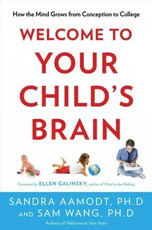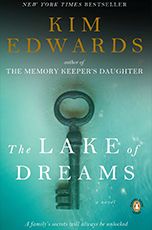In Depth Look at Children’s Brain Development
 Princeton University associate professor of neuroscience, Dr. Sam Wang, and Dr. Sandra Aamodt, former editor of the prestigious scientific journal Nature Neuroscience, have teamed up to write a second book Welcome to Your Child’s Brain: How the Mind Grows from Conception to College (Bloomsbury USA, 336pgs). Their new work studies the development of the young brain and offers suggestions to parents on fostering intellectual growth and self-control. Even from birth, children’s brains are functioning at a high level. “They really come equipped to learn about the world in a way that wasn’t appreciated until recently,” explains Dr. Aamodt in an interview with NPR. “It took scientists a long time to realize that their brains are doing some very complicated things.”
Princeton University associate professor of neuroscience, Dr. Sam Wang, and Dr. Sandra Aamodt, former editor of the prestigious scientific journal Nature Neuroscience, have teamed up to write a second book Welcome to Your Child’s Brain: How the Mind Grows from Conception to College (Bloomsbury USA, 336pgs). Their new work studies the development of the young brain and offers suggestions to parents on fostering intellectual growth and self-control. Even from birth, children’s brains are functioning at a high level. “They really come equipped to learn about the world in a way that wasn’t appreciated until recently,” explains Dr. Aamodt in an interview with NPR. “It took scientists a long time to realize that their brains are doing some very complicated things.”
On building early language skills, she recommends simply speaking to and around young children very often. Parents can also “respond when the baby speaks, even if the baby isn’t forming the words correctly…Just act like some communication has occurred — smile and give the baby a little pat — and that encourages the baby to continue to try to communicate.”
The physicians have also found that children who lean more than one language at an early age have a marked intellectual advantage. “Kids who learn two languages young are better able to learn abstract rules and to reverse rules that they’ve already learned,” states Dr. Aamodt. “They’re less likely to have difficulty choosing between conflicting possibilities when there are two possible responses that both present themselves. They’re also better at figuring out what other people are thinking, which is probably because they have to figure out which language to use every time they talk to somebody in order to communicate.”
Their book also highlights the significance of teaching young children self-control. “This is really critical because there are so many things parents want to do when they read parenting books,” emphasizes Dr. Wang. “They take steps to teach their children math or reading … but a big thing we can do for our children is to do the best to foster the development of self-control and willpower. Self-control and the ability to restrain impulses is associated with success at every age, whether it means being able to read at age 4, or being able to restrain impulses at a later age, or even what your peers think of you in high school. At all of these ages, willpower and self-control is a stronger predictor of academic success than IQ.”

